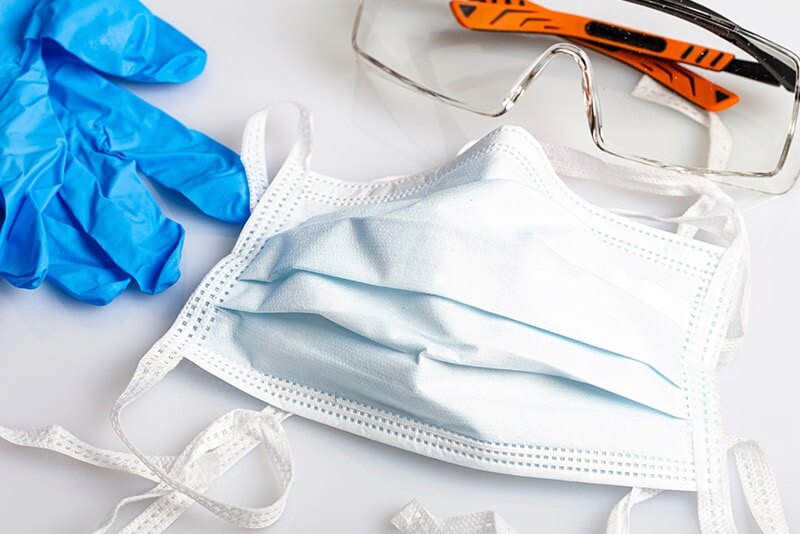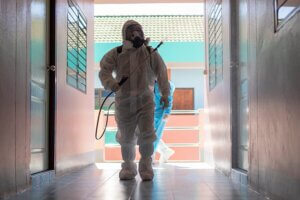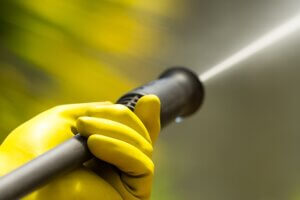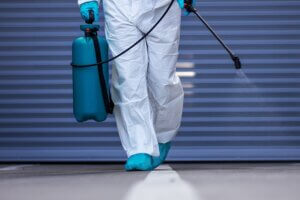BLOG

Biohazard Cleaning Equipment: What Do The Professionals Use?
Biohazard cleaning is a specialised field that requires the use of specialist equipment to properly clean and disinfect contaminated areas. Biohazard cleaning equipment is designed to effectively remove and dispose of hazardous materials, including bodily fluids, chemicals, and other biological substances.
Why Do Biohazard Cleaning Pros Need Specialised Equipment?

Because of the nature of their role, biohazard cleaners need special equipment because they handle hazardous materials that can pose serious health risks. The use of specialised equipment can help:
- Protect biohazard cleaners from exposure to hazardous materials
- Effectively clean and disinfect contaminated areas
- Prevent the spread of infectious diseases
Specialised Biohazard Cleaning Equipment

Below are examples of specialist equipment used by biohazard cleaners daily:
Personal Protective Equipment (PPE)
PPE is essential for biohazard cleaners to protect themselves from exposure to hazardous materials. Examples of PPE equipment include disposable gloves, goggles, respirators, and full-body suits. PPE should always be worn when working in contaminated areas to prevent exposure to infectious diseases and other hazardous substances.
Disinfectants and Cleaning Agents
Biohazard cleaning professionals use specialised cleaning agents and disinfectants that are designed to effectively kill harmful pathogens and bacteria. These disinfectants can include bleach, hydrogen peroxide, and other specialised chemicals that are capable of breaking down and neutralizing biological contaminants. Quite often these chemicals are not available to the general public as they require training in handling and use.
HEPA Filters
High-efficiency particulate air (HEPA) filters are designed to capture and remove microscopic particles from the air. These filters are essential for biohazard cleaners to prevent the spread of infectious diseases and other hazardous materials. HEPA filters are commonly used in air purification systems and vacuum cleaners.
Sharps Containers
Sharps containers are specially designed containers that are used to safely dispose of contaminated needles, syringes, and other sharp objects. These containers are essential for preventing accidental needlesticks and other injuries that can result from improper disposal of hazardous materials.
Pressure Washers
Pressure washers are often used in biohazard cleaning to remove and disinfect contaminated surfaces, such as walls, floors, and outdoor areas. These machines use high-pressure water and specialised cleaning agents to effectively remove and disinfect hazardous materials.
Biohazard Bags
Biohazard bags are specially designed bags that are used to contain and dispose of contaminated materials. These bags are colour-coded and labelled to indicate that they contain hazardous materials and should be disposed of in a specific way. Biohazard bags are often used to safely dispose of contaminated clothing, bedding, and other materials.
Industrial Fans
Industrial fans are commonly used to help dry and ventilate contaminated areas. These fans are powerful and capable of moving large amounts of air, helping to remove moisture and other contaminants from the environment. This can help prevent the growth of mould and other harmful microorganisms.
Dehumidifiers
Dehumidifiers are used in biohazard cleaning to help reduce the moisture content of the air. These machines are designed to remove excess moisture from the environment, helping to prevent the growth of mould and other harmful microorganisms. Dehumidifiers are often used in conjunction with industrial fans to create a dry, well-ventilated environment that is safe for workers and occupants.
Air Scrubbers
Air scrubbers are specialised machines that are used to purify the air in contaminated areas. These machines are designed to remove harmful contaminants from the air, including mould spores, bacteria, and other harmful particles. Air scrubbers can help create a safe, clean environment for workers and occupants.
Biohazard Cleaning Specialty Tools
Biohazard cleaning professionals also use a variety of specialty tools to effectively clean and disinfect contaminated areas. These tools can include scrapers, brushes, sponges, and other specialised cleaning equipment. By using the right tools for the job, biohazard cleaning professionals are able to effectively remove and dispose of hazardous materials.
Biohazard cleaning professionals use a variety of specialised equipment to effectively clean and disinfect contaminated areas. This equipment includes personal protective equipment, disinfectants and cleaning agents, HEPA filters, sharps containers, pressure washers, biohazard bags, industrial fans, dehumidifiers, air scrubbers, and specialty tools. By using this equipment, biohazard cleaning professionals are able to safely and effectively clean and disinfect contaminated areas, protecting themselves and others from exposure to hazardous materials.
Looking For An Experienced & Trusted Biohazard Cleaning Specialist?

For all your professional biohazard cleaning needs, speak to the team at National Trauma (NTCSC). When it comes to specialist biohazard clean up and remediation, our team have the necessary experience, certifications and specialist equipment to get the job done safely and effectively.
Give our team a call anytime 24/7 and ask for an obligation free quote on our specialist cleaning services.